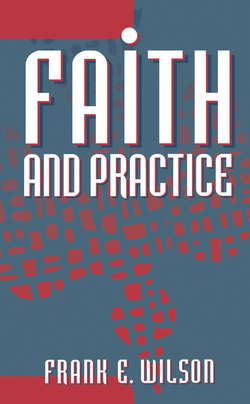Читать книгу Faith and Practice - Frank E. Wilson - Страница 10
На сайте Литреса книга снята с продажи.
III REVELATION
ОглавлениеMan is a combination of many things. If he consisted entirely of mind, the solution of human problems would be greatly simplified. But that does not happen to be the case. Undoubtedly one of the chief causes of confusion in the realm of religious experience arises out of the tendency to treat Man purely as a reasoning creature when we know very well he is much more than that. He is also the embodiment of instincts, intuitions, emotions, will—feelings and impulses—ideals and aspirations. Knowing all this, how can we still insist that Man’s every action must be judged only at the bar of reason? Religion as a determining factor in the emotions and will as well as the intellect cannot be submitted to such an inadequate test. It is scarcely in order to declare that spiritual elements which human reason may not be able to digest shall promptly be ruled out as unreasonable. It is too much like saying that a baby is inhuman because he creeps on all fours. Religion may be reasonable without being absorbed in reason.
Now the Christian religion deals with all of human life. Certainly it appeals to a man’s reason but it does more than that. It also touches his emotions, draws upon his instincts, and stimulates his will. The scope of it includes reason but surpasses it. Let us emphasize this point. We are quite likely to accept something as true if we can wrap our minds around it and to declare something else untrue if it is beyond our intellectual comprehension. To reach such a conclusion is to use only part of our natural equipment. Is truth really dependent upon our mental abilities? How often does one say—“I know something is so but I can’t tell you just why.” We have no more right to declare a thing untrue because it escapes our reason than we have to declare a thing invisible because it is beyond our sight. We may not be able to see it but it may still be capable of being seen. Our intuitions and our feelings may be able to reach points which our minds may be unable to penetrate, but our conclusions may be no less valid because of that. The appeal to reason is wholesome and necessary, but it is not the only appeal in the broad field of human experience.
It is not easy for us to grasp this because we of the modern age have been so deeply inoculated with a spirit of unquestioning confidence in scientific achievement. We must remember that science is descriptive. It does not explain things—it describes what it finds. By experiment the scientist learns that the same elements under similar conditions always act the same way. That’s good science. When the materialist adds—therefore, the whole world is one great machine driven by blind force—he is not at all scientific. He has stepped quite outside the field of science and has used his imagination. The Christian welcomes the scientist’s facts, but denies the conclusions of the materialist on other grounds entirely.
It sounds very wise and very practical for one to say—“Of course, you can’t expect me to accept something which I do not understand.” Very well—then you will refuse to listen to the radio, you will decline to answer the telephone, you will stay out of elevators, you will refrain from riding in railroad trains, automobiles, or airplanes, you will deny yourself any medical treatment, and you will send away most of the food prepared for your meals. Show me the person who understands all of these daily accessories of modern life which we accept and use without question! Oh, but you say, somebody understands these things and we find they actually work. So also says the Christian. Christ understands God fully, and plenty of devout followers of Christ have had a good usable knowledge of Him. We lay hold of their experience and we also find it works.
Must it be true that the only things that really happen are those which we can understand? In that case there could have been no eclipses of the sun and moon a thousand years ago when people were ignorant of what an eclipse might be. There could have been no tidal waves or earthquakes. Pompeii could not have been actually destroyed by a volcanic eruption. Certainly there never could have been a Gulf Stream at that time because our ancestors had not yet discovered it and they could not have explained it if they had discovered it. The answer comes that today we do understand such happenings and therefore they might well have occurred despite the prevalent ignorance of those earlier times. Well—how can we tell how much our descendants a thousand years hence may be able to understand? It is quite likely that they will be far more enlightened than we are, and various matters which we might be tempted to rule out today may be simple of explanation for them. All of which warns us that we should be properly cautious about discounting those occurrences which are commonly called
